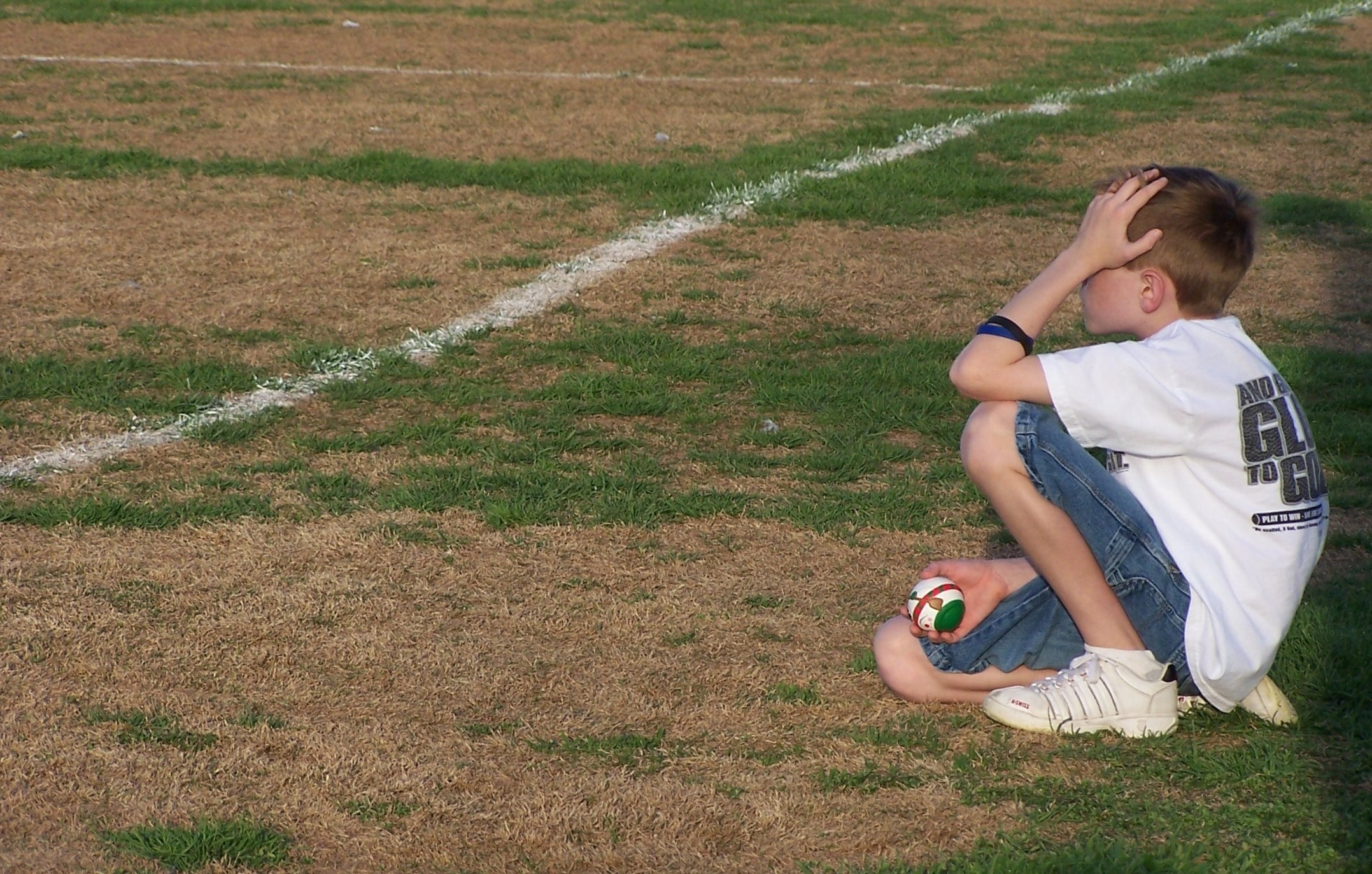In a society in which striving to be the best is considered admirable (or at least amusing enough to produce grotesque amounts of reality TV), possessing no desire to be No. 1 can make for some interesting experiences.
I came to the conclusion at a pretty young age that I don’t have a single competitive bone in my body. I’ve never been into racing. Dorky victory dances kind of gross me out. If a guy I’m interested in reveals himself to be a sore loser, that’s an instant deal breaker for me.
It wasn’t until I was a bit older and involved in team sports that I went on to realize that being a non-competitive person is generally viewed as abnormal. It seems as though many people can’t seem to separate competition from the desire to work hard or do well at something. As an unfortunate result, those who couldn’t give a flying pancake about whether or not they are the best tend to feel a bit out of place in the world.
From kindergarten through sophomore year of high school, I played soccer. I was a decent midfielder, probably mostly due to the fact that I was one of the only people who was willing to run that much. Although my coaches typically liked me, the one piece of criticism I received continuously throughout my soccer career was that I never got aggressive when I needed to be. I simply didn’t care enough about winning to physically shove and kick my way to first place. Rather than “getting in there” as my couch would encourage me, or “smacking b—— around” as my team mates would say, I found myself muttering apologies under my breath any time I made bodily contact with other players.
I really do enjoy soccer. It’s a fun, fantastic workout, and I hold the unpopular opinion (with Americans at least) that it is interesting to watch. However, winning was never important enough to me to throw around my elbows and step on toes. I’d much rather just enjoy the game.
When my sizable family hunkers down after Christmas dinner for our annual bingo tournament (it’s as riveting as it sounds), I strategically place myself in a spot where my game board is hidden from view. That way, when I get bingos, no one will call me out for refusing to vocalize my victory. In my mind, I’m very content to just sit back and soak in the warm, gooey moment.
We’re all cozied up, chatting and drinking and spending quality time with one another. Besides, I’m not interested in the toenail clipper set that my Grandma contributed to the prize pile, along with the other well meant but unintentionally white elephantine gifts. Although I’m perfectly happy to play for fun, some of my relatives are pretty competitive about it. They’ll frown as they clean their boards off at the end of each round, getting progressively saltier as the game goes on and they remain bingo-less.
Another struggle non-competitive people encounter is that of the modern dating scene. This is because the idea of love as a competition is a big trend, showcased by the massive popularity of love triangles and TV shows like “The Bachelor.” Peeta and Gale have perpetuated the idea that it’s totally cool to spend a stupid amount of time and energy competing for human affection, even if the individual being pursued is apathetic as f—. If someone I’m interested in shows substantial attraction to someone else, I’m outsies.
I’m simply not in the business of being an option as opposed to a priority.
What I’ve found is that that other people—many other people in fact—seem to thrive off of that sort of competition; games and players exist for a reason. With dating websites and apps like Tinder, it’s much easier to have lots of people to choose from at one time. You don’t even necessarily need to be on a TV show anymore to create your own personal, competitive dating pool.
The most basic dilemma that non-competitive people face though, is the fact that we are just as mystified by competitive people as they are by us. I’ve spent a lot of time contemplating the difference between how competitive and uncompetitive people think, and I feel as though I’ve come up with a few probable theories.
Firstly, this difference in temperament could be related to what motivates individuals. Some people feel spurred on by competition, while it has the opposite effect on others. A good example of the motivation idea is the previous discussion on dating competition. Secondly, various people find different environments more conducive to productivity than others. While a competitive environment may be exciting to some people, it can be straight up stressful to others.
Ultimately, everyone would likely benefit from taking the time to understand where others find their drive to succeed and pursue their passions. For example, I now realize that if I’m not too concerned with competition that it would have been better idea to stick only with local park league soccer rather than playing for a traveling team for two summers. Additionally, competitive peeps should keep in mind that a lack of competitive instinct does not equal a lack of ambition and fervor.










Hey Josephine! Cara from Milwaukee here. You literally have voiced my every thought and feeling on competition. I am the same in that I do not have a competitive bone in my body. And it’s been hard to explain to people! Especially people I date. I dated a guy that was in a bar volleyball league recently, and the way that he complained about everything after losing was extremely annoying to me. That relationship didn’t end up working, and I’ve been thinking back on how he really was competitive about everything in his life and I just couldn’t fathom it. What are we to do?! I’m not in a race to find the love of my life but I do wonder if we are in a very small minority being uncompetitive individuals.
I can really relate to this post! It’s refreshing to see someone articulate the challenges of being noncompetitive in a world that often values winning above all else. I’ve always felt pressure to compete, but this perspective makes me feel more at peace with my approach to life. Thank you for sharing your thoughts!
I feel the same way. I recently changed my job from being a chef to being a baker. It took me a little bit to realize why i am so much happier now. The position was so competitive. When I’m supposed to be competitive, it makes me feel that I need to prove myself to others. I’m comparing myself to others. It feels unauthentic to me. I have always thought of myself as laid back and easily content, but competitive traits are taught to be a valuable strength, which weirdly makes me even less interested in trying to step into that. I don’t really care about it really. It was refreshing to read this and see someone else who feels this way. I am ambitious and motivated, I can tell you are too. But because of the stigma of people who are less competitive, it was definitely an insecurity of mine for a long time!
This post really resonated with me! It’s refreshing to see someone articulate the challenges of being noncompetitive in a world that often values aggressive ambition. I appreciate the reminder that it’s okay to embrace a different pace and focus on personal satisfaction rather than comparison. Thank you for sharing your perspective!
Many years ago, in my 20s, I went for an job interview. The interviewer, a very pleasant person, finished her initial presentation to me with the words:
“…………and of course, there’s always the Competition, to show what you can do……”
BRAIN: SHUT UP MOUTH.
BRAIN: REALLY, SHUT UP MOUTH, DON’T, DON’T. too late…………………….
” to whom? “…………………..I answered.
It was many years later, after realising that something was definitely “odd”, I was finally diagnosed with a form of agoraphobia, specifically, apanthropy, which suddenly put everything in perspective for me.
What other people think of me, is none of my business. I don’t follow anyone nor do I wish to lead. I abhor all sport and that testosterone fueled, “I’ve got to show you, I’m better than you”, is so twee, it’s laughable.
I have a couple in-laws that are competitive in many ways. Lately it’s the competition for being closest in relationships to other family members and knowing more info about others. It’s not uncommon for one member to act like she’s closer to my daughter than me and my mother. It’s the most bizarre and infuriating situation I deal with. I stopped dealing with the family except when necessary and it has served me well. It bothers them but I just can’t deal with the insanity of their behaviors.